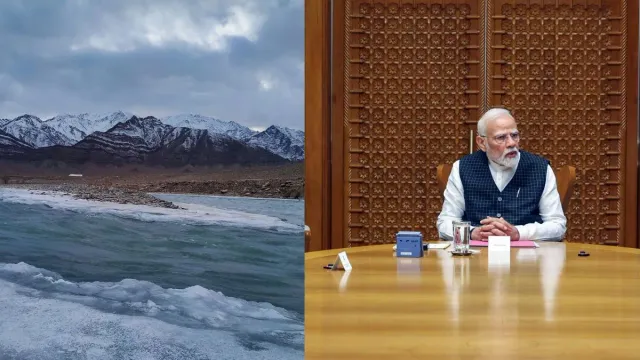- By Nidhi Giri
- Thu, 24 Apr 2025 01:33 PM (IST)
- Source:JND
Indus Waters Treaty Suspended News: In response to the horrific attack in Jammu and Kashmir's Pahalgam and discovery of Pakistani links to it, New Delhi on Wednesday suspended The Indus Waters Treaty (IWT) with its neighbour, for the first time. The treaty governs the sharing of river waters between the two countries. India’s decision came a day after the attack on tourists by Pakistani terrorists left 26 people dead including 25 Indians and one Nepali citizen. The Resistance Front (TRF), a proxy of the Pakistan-based terror organisation Lashkar-e-Taiba (LeT), claimed responsibility for the brutal assault. As a result, India came down heavily on Pakistan, targeting its infrastructure, diplomatic presence, and movement across borders.
What Is The Indus Waters Treaty
The Indus Waters Treaty, signed in 1960, has long been a cornerstone of India-Pakistan relations, and the recent decision marks a significant shift in diplomatic ties. This suspension will remain in effect until Pakistan ceases its support for cross-border terrorism.
“The Indus Waters Treaty of 1960 will be held in abeyance with immediate effect, until Pakistan credibly and irrevocably abjures its support for cross-border terrorism,” Foreign Secretary Vikram Misri said on Wednesday evening.
Working Of The Indus Waters Treaty
As per the agreement, India has control over the eastern rivers: Ravi, Beas, and Sutlej, while Pakistan receives the waters from the western rivers: Indus, Jhelum, and Chenab. Both countries are allowed limited use of the rivers assigned to the other for specific purposes like irrigation and power generation.
The treaty set up a framework for fair and cooperative management of the Indus River system, which is essential for agriculture, drinking water, and industry in both India and Pakistan, according to the World Bank. It outlined clear guidelines for the equitable sharing of the river and its tributaries to ensure both nations could meet their water needs.
Need For The Indus Waters Treaty
When British India was divided in 1947, the Indus River system, which begins in Tibet and flows through both India and Pakistan, also touching parts of Afghanistan and China, became a source of tension.
In 1948, India temporarily stopped the flow of water to Pakistan, leading Pakistan to raise the issue with the United Nations. The UN recommended involving a neutral third party, prompting the World Bank to step in and mediate. After years of negotiations, the Indus Water Treaty was finally signed in 1960 by Indian Prime Minister Jawaharlal Nehru and Pakistani President Ayub Khan to peacefully manage and share the vital river system.
Impact Of Indus Water Treaty Suspension On Pakistan
After the complete annulment of this treaty, India has effectively crippled Pakistan.
-Jhelum, Chenab, Ravi, Beas, and Sutlej rivers serve as Pakistan's principal water resource, supporting a population of tens of millions.
-The treaty benefits Pakistan as it receives about 80 per cent of the total water flow from these rivers, which are vital for agriculture in Pakistan, especially in the provinces of Punjab and Sindh. Pakistan relies substantially on this water supply for irrigation, farming and potable water.
-The Indus basin supplies 154.3 million acre-feet of water yearly, which is vital for irrigating extensive agricultural areas and ensuring food security. Any interruption to water flow would significantly impact Pakistan's agricultural sector, a crucial component of its economy and rural livelihoods.
-Pakistan already faces critical water management issues such as groundwater depletion, salinization of agricultural lands, and limited water storage capacity.

